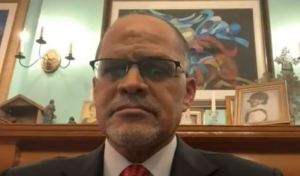
By GBMC Healthcare
If left uncontrolled, diabetes can cause irreparable damage to the body and an individual’s lifestyle. The good news is the best tool someone can have in managing their diabetes is an ongoing relationship with their primary care provider.
Diabetes is a chronic illness, which means it requires regular maintenance to stay controlled and allow people to continue their traditional lifestyle as much as possible. The disease—which is most common in those over 45, those with a family history or those who are overweight—occurs when the body develops an inability to manage the production of insulin.
Black adults are almost twice as likely as white adults to develop diabetes, which is why education on the signs, symptoms and treatment options is vital.
Dr. James Baronas, a family medicine physician at GBMC Health Partners Primary Care—Jonestown, located at 1017 E. Baltimore Street, said a diabetes diagnosis no longer means lifelong insulin injections. He discussed several treatment options and services available at his practice.
“Pills and other oral medicines available today are really helpful. Treatment doesn’t just mean insulin anymore, especially if you catch it early,” Dr. Baronas said. “Lifestyle changes are crucial. Healthy eating includes cutting down on simple carbs and sugars as well as not drinking calories, like in sodas and teas. Also, having a healthy meat protein and a colorful plate of vegetables for meals is a great start.”
The path seems simple, but without support, it can be a challenge to learn how to manage a new diagnosis. The team at GBMC Jonestown offers a range of resources that can make it easy to manage an illness.
Convenience is key. GBMC Jonestown has a lab onsite for blood work, and the team can provide connections to local community organizations for transportation needs and food access.
In addition to primary care providers like Dr. Baronas, a care coordinator and a nurse care manager are available to patients to help in monitoring patient progress and explaining to patients how to check their sugar. They also follow up with patients at least once a month to check in and answer questions.
It is important to have consistent follow-up because uncontrolled blood sugar can cause complications such as chronic kidney disease and kidney failure, neuropathy and chronic nerve pain, an increased risk for heart attack and stroke, or diabetic eye disease.
About 40% of those with diabetes will develop some form of diabetic eye disease. At GBMC Jonestown, a diabetic retinopathy camera is available to conduct a diabetic eye exam.
This convenient, coordinated, and comprehensive approach to care has been proven effective at managing diabetes. Since August 2022, the number of Jonestown patients with uncontrolled diabetes (defined by poor A1C levels) went from 45% to 23%.
“We take a total approach to truly understanding the patient and what their values are,” Dr. Baronas said. “Diabetes is much more than just eating the wrong things. A total approach requires correcting diet, taking the right medicines, working on exercise, and looking at the whole person. You have to treat the whole person to get diabetes under control.”
The post Managing Diabetes with a Team appeared first on AFRO American Newspapers .











